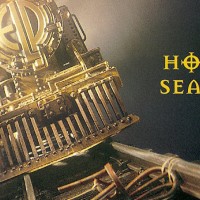The double-album Works Vol. 1 — released on March 17, 1977 — was a highly anticipated moment for fans of Emerson Lake and Palmer, arriving as it did some three-and-a-half years after Brain Salad Surgery. Unfortunately, the project didn’t herald a new era for ELP, so much as the end.
Inside, there were three sides devoted to solo efforts, before a fourth side that included collaborative music. Five albums in, it seemed every member had ideas to spare — things that might not have fit under the umbrella of Emerson Lake and Palmer.
Keyboardist Keith Emerson, for instance, opened the album with a concerto, followed by a set of acoustic ballads from bassist Greg Lake co-written with Peter Sinfield, who like Lake also worked with King Crimson. Side 3 was devoted to pieces led by drummer Carl Palmer.
“That was the first branch away to solo ideas,” Palmer told DrumTalkTV, “though we still played as a group. If you had music that didn’t suit the group, we would bring it in and try it, and then it would just be pushed aside. That’s why Works Vol. 1 had to come about — because we had all of this material. Always, the group came first in those situations but you can’t stop writing if it doesn’t suit the group. You’ve just got to find another outlet for it.”
Palmer’s side included a remake of “Tank” from Emerson Lake and Palmer’s self-titled debut. Joe Walsh from the Eagles sat in on “L.A. Nights.” Palmer also took on a portion of Prokofiev’s “The Scythian Suite.” The Side 4 collaborations memorably included Emerson Lake and Palmer’s take on “Fanfare for the Common Man,” by Aaron Copland. Still, it sounded like they were breaking up.
Instead, it seemed like Emerson Lake and Palmer was ready to bulk up. They went on to mount one of the most extravagant tours in rock history, making the outsized decision to tour the Works project with a full orchestra. That financial only increased the strain on a band clearly buckling under the twin weights of longevity, and of expectation.
“I remember one night, I was looking for the tour manager,” Lake said, years later. “We used to book hotels — not rooms, whole hotels. And I went looking for the tour manager, and I’d go up floor by floor on the elevator, and I’d pop my head out. I’d look down the corridor and there would be all of these room service trays, with buckets with wine bottles stuck upside down in them. And I realized I was paying for it all!”
The idea of combining rock with classical music had been at the heart of Emerson Lake and Palmer’s goals from the beginning, but recording vs. touring in that format were two very different things. Besides the obvious bank-draining budget concerns, ELP was also working in an era of terribly antiquated equipment.
They only got through 10 dates with this group of 70 hand-picked musicians, conducted by Godfrey Salmon. Thankfully, an August 1977 date in Montreal was taped for posterity, though even then there were technical issues. Keith Emerson salvaged what he could for a subsequent 1979 release called Emerson Lake and Palmer in Concert, which was then -rereleased as Works Live in 1993 and — in an expanded format — as Live in Montreal 1977 in 2013.
“There was six people mixing the sound,” Lake added. “There was 140 people on the road, I believe. It cost us $3 million of our own money, back then. I don’t know what it would be now. It was a hurtful amount. In the end, it just proved to be so unwieldy.”
In some respects, so had ELP. The group released just two more albums, an odds-and-ends collection called Works Vol. 2 and the ill-fated Love Beach, before taking a lengthy hiatus.




“With great musicianship comes great responsibility.”
Of course, by now the solution has come to be “pickup” orchestras, made up of the best musicians available in each city. Each one may not work so well together as a single group of people that’s been playing the material for weeks, but at least there’s not the expense of taking them all around the country with you.
In a way, the orchestra was a way of putting off the question of what to do after Brain Salad Surgery–a question that’s bugged them ever since, which is probably why we’ve heard so little new music from them in the last 40 years (!).
(There was “Pirates”, the one new group piece on Works 1. *Memoirs of an Officer and a Gentleman” got lost in all the front-loaded Greg Lake pop on Love Beach, which was trying to answer the business question of how to keep ELP going, not the artistic question of what new music ELP should be making. It could’ve been Emerson, Lake and Powell if they’d just been willing to wait half a year for Carl Palmer. But ultimately, it might just be that Keith and Greg very long ago reached a point where they’d done most of what they could do together.)